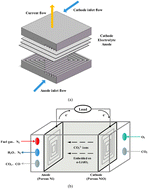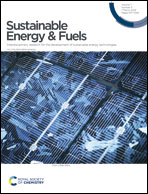An experimental study of the effects of key operating parameters on the molten carbonate fuel cell performance†
Abstract
Proper selection of the operating conditions of molten carbonate fuel cells (MCFCs) can not only effectively improve the efficiency of power generation, but also reduce carbon emissions and help achieve the great goal of “carbon neutrality”. In this study, an MCFC single-cell experimental bench with a polarization area of 225 cm2 is built to study the effects of key operating parameters on the MCFC performance. The experimental results show that when the cell uses pure H2 as the input fuel, the optimal operating temperature of the cell is 650 °C, and the performance of the cell will decrease after exceeding 650 °C. When pure CH4 is used as the input fuel of the cell, the cell can also undergo an electrochemical reaction to produce electricity, but the performance of the cell is low, so this MCFC single cell is not suitable for using pure CH4 as the fuel. Finally, a comparative experimental study of pure H2 and H2 blended with CH4 gas is conducted. The results show that the cell performance is better when the cell fuel uses a mixture of H2 : CH4 = 9 : 1 than when pure H2 is used as the fuel. A small amount of CH4 blended with H2 is more conducive to electrochemical reactions.


 Please wait while we load your content...
Please wait while we load your content...